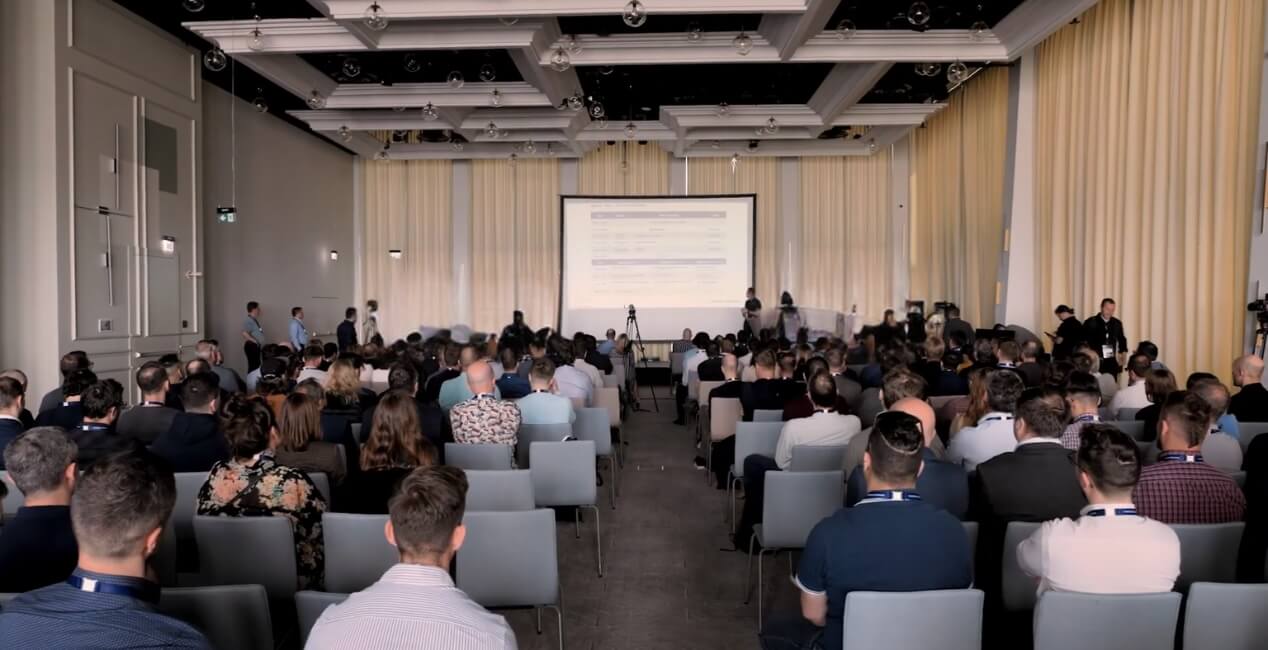Conferences play an important role in encouraging idea-sharing, building connections, and collaboration within various industries. They create a dynamic environment where professionals come together to share insights and experiences. Now you might be wondering, “What is the role of the conference?”
The role of conferences is to facilitate the interaction of individuals with shared interests to exchange knowledge, discuss relevant topics, and collaborate on ideas. Participant knowledge and professional development are advanced through networking, learning, and innovation in specific fields or themes.
Curious to know more about how conferences can benefit you? Follow along as we explore deeper into the multifaceted role of conferences and their impact on various industries and professions.
Conference: What Do You Need to Know About It?
Attending a conference is a great way to learn from experts, meet like-minded individuals, and gain insights into a particular field. These events bring together professionals, researchers, and industry leaders to share knowledge. Whether large or small, conferences help participants stay updated with the latest trends, innovations, and discussions.
Each conference has a structured schedule, including keynote speeches, panel discussions, and interactive workshops. Attendees get the chance to listen to experienced speakers and participate in Q&A sessions. Some conferences also offer networking opportunities, allowing participants to connect with others in their industry. Proper planning ensures attendees can make the most of these events.
Registration is often required to attend, with different options based on access to sessions and materials. Some conferences provide early-bird discounts, while others offer virtual attendance for those unable to travel. Organizers may also include additional benefits such as digital resources, merchandise, and exclusive networking sessions to enhance the attendee experience.
Choosing the right conference depends on your field of interest, location, and available resources. Many international events take place across various countries, offering diverse learning experiences. For instance, conferences in Canada often attract a wide range of professionals, providing valuable discussions in different industries. Researching events in advance helps in selecting the most beneficial ones.
What is the Role of the Conference?
Conferences are essential for professional development and industry advancement. Individuals with shared interests can exchange knowledge and collaborate on innovative ideas through these organizations. Participants can maximize their benefits by understanding conferences’ multifaceted roles.
Facilitating Knowledge Exchange
Conferences provide a platform for sharing research and developments. Attendees can learn about innovative technologies and methodologies from experts. This exchange of information helps keep professionals updated with industry trends. It creates a culture of continuous learning and growth, which is essential for professional development.
Encouraging Networking
Networking is a key component of conferences. Participants can connect with peers, mentors, and industry leaders. These connections often lead to collaborations and partnerships. Networking increases professional growth, opens up new opportunities, and helps attendees expand their influence within their industry.
Discussing Relevant Topics
Conferences focus on discussing current and relevant topics within a specific field. These discussions help identify challenges and propose solutions. Engaging in these conversations broadens participants’ perspectives. This process encourages critical thinking, problem-solving, and staying ahead of the curve in one’s profession.
Promoting Innovation
During conferences, innovation thrives in a collaborative environment. Sharing ideas and feedback can spark new concepts and improvements. This collaborative spirit drives advancements in the industry. Conferences serve as excellent ground for developing innovative ideas and practices that push the boundaries of traditional thinking.
Supporting Professional Development
Personal and professional growth depends on conferences. Attendees gain new skills and knowledge through workshops and presentations. These learning opportunities contribute to career advancement. Continuous professional development is necessary for remaining competitive, and conferences provide the resources to meet these evolving demands.
Conferences play a multifaceted role in shaping industries and professionals. By participating actively, individuals can tap into the great potential that these events offer, paving the way for continued growth and advancement.
How Do Conferences Benefit Participants?
The benefits of conferences can increase both a participant’s professional and personal development. By attending, individuals can gain new insights, expand their network, and sharpen their skills. Here’s how conferences benefit participants in various ways.
- Learning from Expert Presentations: Expert presentations provide insights into the latest industry trends. These presentations offer valuable information that can be directly applied to their work. Having a basic idea of the origin of conference helps appreciate how these platforms have developed to disseminate crucial knowledge across various fields.
- Improving Skills Through Workshops: Workshops provide hands-on experience and practical skills relevant to the field. They offer interactive learning opportunities that help participants develop new competencies.
- Expanding Professional Network: Networking opportunities at conferences allow participants to connect with peers, mentors, and industry leaders. Building these connections can lead to future collaborations and career advancements.
- Gaining Fresh Perspectives: Engaging with diverse viewpoints at conferences broadens participants’ perspectives. Through exposure to different ideas and approaches, it encourages innovative thinking.
- Staying Updated with Industry Trends: Conferences keep participants informed about the latest trends and technologies in their field. Staying updated helps them remain competitive and adapt to industry changes.
- Boosting Professional Profile: Presenting at conferences or participating in discussions can improve a participant’s professional profile. It demonstrates their expertise and commitment to continuous learning and growth.
- Inspiring Personal Growth: Conferencing can inspire motivation and growth. Participants’ enthusiasm for their work can be revived through exposure to new ideas.
Attending conferences offers a wide range of benefits that extend beyond just professional development. The experience can lead to personal growth, new opportunities, and lasting connections that shape your career and future endeavors.
How to Find Upcoming Conferences in Your Field?
You can significantly boost your professional development by finding upcoming conferences in your field. Here’s a step-by-step guide to help you discover relevant events and stay ahead in your industry.
Check Conference Organizer Websites
A renowned conference organizer often lists upcoming conferences in your field. Check their websites or newsletters for the latest information, as the role of conference organizers is crucial in keeping you updated. Membership benefits typically include early access to event details and discounts on conference registration fees.
Explore Academic Journals
Academic journals frequently advertise relevant conferences. Look for announcements in the latest issues or special editions. These journals often have a dedicated section for upcoming events, providing dates, locations, and themes.
Join Online Chat Rooms and Groups
A good resource for your industry is a discussion board or group on the Internet. Members often share information about upcoming conferences. Participate actively to stay informed and receive recommendations from peers and industry experts.
Follow Industry Influencers
Industry influencers frequently use social media to share conference details. Follow them on platforms like LinkedIn and Twitter. Their posts can provide insights into popular conferences and emerging trends in your field.
Staying informed about upcoming conferences is essential for continuous growth. By taking advantage of various resources, you can ensure you’re always ahead in your field and ready to seize new opportunities for advancement.
Conference Tips: How to Get the Most out of It?
It is possible to have an enriching experience at conferences if they are approached correctly. You can maximize the benefits by preparing and engaging actively. Here are some tips to help you get the most out of your conference experience.
Plan Ahead
Identify sessions relevant to your interests from the conference schedule, paying special attention to the characteristics of top-tier conferences. Prioritize keynotes and workshops that align with your professional goals. Pre-register for sessions to secure your spot and avoid last-minute issues. Having a plan helps you make the most of your time.
Network Actively
During breaks and social events, engage with fellow attendees. Introduce yourself and exchange contact information for future collaboration. Attend networking sessions designed to facilitate connections. Building relationships can open new professional opportunities.
Engage in Discussion
Get deeper insights by asking questions during sessions. Share your experiences and viewpoints to contribute to the conversation. You will learn more and be remembered if you participate actively in discussions. Your engagement can also benefit other attendees.
Take Notes
You can take notes on your digital device or in a notebook. Note interesting ideas, resources, and contacts you meet. Review your notes after the conference to consolidate your learning. Keep notes so you don’t forget anything.
Visit the Exhibition Booths
Discover new products and services at the exhibition area. Engage with exhibitors to learn about the latest innovations in your field. Collect brochures and business cards for future reference. Exhibitions are great for staying updated with industry advancements.
Follow Up Post-Conference
Connect with new contacts after the conference. Share your insights and thank them for valuable conversations. Implement new ideas and strategies you learned during the event. Following up ensures lasting benefits from your conference experience.
Conferences provide a unique opportunity to learn, connect, and grow within your field. By actively participating and staying engaged, you can ensure that your experience is both rewarding and impactful for your professional journey.
FAQs for What is the Role of the Conference?
Professional development and industry advancement are greatly facilitated by conferences, which bring together individuals with shared interests. Here are some frequently asked questions to help you understand the multifaceted role of conferences.
What Are the Primary Objectives of a Conference?
The primary objectives of a conference are to facilitate knowledge exchange, promote networking, and encourage collaboration among professionals. Conferences aim to present the latest research and developments in a specific field. They also promote discussions on current issues and future trends.
What Are the Networking Benefits of Attending a Conference?
Networking at conferences allows participants to connect with peers, mentors, and industry leaders. These connections can lead to future collaborations and career opportunities. Building a professional network is essential for personal and professional growth.
How Do Conferences Contribute to Professional Development?
Conferences contribute to professional development by offering workshops, presentations, and discussions that improve skills and knowledge. Attendees learn about the latest trends and technologies in their field. This continuous learning helps professionals stay competitive and advance in their careers.
Why is Knowledge Exchange Important at Conferences?
Knowledge exchange at conferences keeps professionals updated with industry advancements and best practices. Sharing information and experiences helps attendees apply new insights to their work. It also encourages a culture of continuous improvement and learning.
How Can Presenting at Conferences Boost Your Professional Profile?
Presenting at conferences demonstrates your expertise and commitment to continuous learning. It improves your visibility and reputation within the industry. Sharing your research and insights can lead to new opportunities and professional recognition.
Final Thought
Conferences provide opportunities to learn, network, and innovate for professional and personal development. Participants gain insight from presentations, engage in hands-on workshops, and build valuable connections. Professional growth can be significantly increased by knowing how to find and use conferences.
Knowing of what is the role of the conference helps attendees maximize their experience. A conference facilitates knowledge exchange, promotes networking, and inspires innovation. They also provide a space for discussing relevant topics and exploring new ideas, driving industry advancements.
A successful conference requires strategic planning, active engagement, and thoughtful follow-up. Participants should plan, network actively, and engage in discussions to get the most out of their experience. Post-conference actions like following up with new contacts and implementing new ideas ensure lasting benefits.








